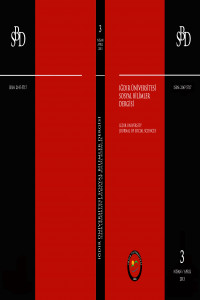Abstract
Evrenin varlığıyla ilgili sistematik ve kuşatıcı düşünce örneklerine ilk olarak Platon ve Aristoteles felsefelerinde rastlıyoruz. Platon, tüm düşüncesinin temeli olan idea öğretisiyle, nesnel dünyanın gölgelerden ibaret olduğunu kabul etmiş ve aslolan şeyin ideal dünyada olduğunu öne sürmüştür. Buna karşın Aristoteles, varlıkla ilgili düşüncelerini bireysel tözleri dayanak yapan bir anlayışla şekillendirmiş, Platoncu idealizmin yalnızca kavramsal bir yapı olduğunu ve gerçekliğin salt formlar ya da idealardan ibaret olmayıp her ikisinin ayrılmaz bütünlüğünden meydana geldiğini savunmuştur. Bu yazıda her iki görüşün temelleri kısaca ele alınacaktır.
References
- Alfarabi, Alfarabi’s Philosophy of Plato and Aristotle, trans. Muhsin Mahdi, New York: The Free Press of Glencoe, 1962.
- Aristotle, Categoriae, trans. E.M. Edghill, The Works of Aristotle, vol. I, ed. W. David Ross, Oxford: Clarendon Press, 1928.
- Aristotle, De Anima, trans. J.A. Smith, vol. III, The Works of Aristotle, ed. W. David Ross, Oxford: Clarendon Press, 1931.
- Aristotle, De Caelo, trans. J.L. Stocks, The Works of Aristotle, vol. II, ed. W. David Ross, Oxford: Clarendon Press, 1930.
- Aristotle, De Generatione et Corruptione, trans. H.H. Joachim, The Works of Aristotle, vol. II, ed. W. David Ross, Oxford: Clarendon Press, 1930.
- Aristotle, Metaphysica, trans. W. David Ross, The Works of Aristotle, vol. VIII, ed. W. David Ross, Oxford: Clarendon Press, 1925.
- Aristotle, Physica, trans. R.P. Hardie & R.K. Gaye, The Works of Aristotle, vol. II, ed. W. David Ross, Oxford: Clarendon Press, 1930.
- Plato, Epinomis, trans. Alfred Edward Taylor, London: Thomas Nelson & Sons, 1956.
- Plato, Laws, trans. Benjamin Jowett, The Dialogues of Plato, vol. V, London: Oxford University Press, 1892.
- Plato, Phaedo, trans. Benjamin Jowett, The Dialogues of Plato, vol. II, London: Oxford University Press, 1892.
- Plato, The Republic, trans. Benjamin Jowett, The Dialogues of Plato, vol. III, London: Oxford University Press, 1892.
- Plato, Timaeus, trans. Benjamin Jowett, The Dialogues of Plato, vol. III, London: Oxford University Press, 1892.
- Ross, David, Aristotle, London & New York: Routledge, 1995.
- Zeller, Eduard, Outlines of the History of Greek Philosophy, trans. R.L. Palmer, New York: Meridian Books, 1955.
Abstract
We firstly find traces of systematical and comprehensive thought related to existence of the universe in Plato and Aristotle. Plato, by the doctrine of ideas which is the basis of his whole philosophy, accepted that the objective world was to be composed of shadows, and he propounded that the essential was in ideal world. On the contrary, Aristotle has shaped his thoughts related to being by conception made individual substances as base, and he defended that Platonic idealism was only a conceptual structure and the truth was not composed of absolute forms or ideas but it was to be consist of indivisible unity of them. In this paper it will briefly be dealt with the bases of both conceptions.
References
- Alfarabi, Alfarabi’s Philosophy of Plato and Aristotle, trans. Muhsin Mahdi, New York: The Free Press of Glencoe, 1962.
- Aristotle, Categoriae, trans. E.M. Edghill, The Works of Aristotle, vol. I, ed. W. David Ross, Oxford: Clarendon Press, 1928.
- Aristotle, De Anima, trans. J.A. Smith, vol. III, The Works of Aristotle, ed. W. David Ross, Oxford: Clarendon Press, 1931.
- Aristotle, De Caelo, trans. J.L. Stocks, The Works of Aristotle, vol. II, ed. W. David Ross, Oxford: Clarendon Press, 1930.
- Aristotle, De Generatione et Corruptione, trans. H.H. Joachim, The Works of Aristotle, vol. II, ed. W. David Ross, Oxford: Clarendon Press, 1930.
- Aristotle, Metaphysica, trans. W. David Ross, The Works of Aristotle, vol. VIII, ed. W. David Ross, Oxford: Clarendon Press, 1925.
- Aristotle, Physica, trans. R.P. Hardie & R.K. Gaye, The Works of Aristotle, vol. II, ed. W. David Ross, Oxford: Clarendon Press, 1930.
- Plato, Epinomis, trans. Alfred Edward Taylor, London: Thomas Nelson & Sons, 1956.
- Plato, Laws, trans. Benjamin Jowett, The Dialogues of Plato, vol. V, London: Oxford University Press, 1892.
- Plato, Phaedo, trans. Benjamin Jowett, The Dialogues of Plato, vol. II, London: Oxford University Press, 1892.
- Plato, The Republic, trans. Benjamin Jowett, The Dialogues of Plato, vol. III, London: Oxford University Press, 1892.
- Plato, Timaeus, trans. Benjamin Jowett, The Dialogues of Plato, vol. III, London: Oxford University Press, 1892.
- Ross, David, Aristotle, London & New York: Routledge, 1995.
- Zeller, Eduard, Outlines of the History of Greek Philosophy, trans. R.L. Palmer, New York: Meridian Books, 1955.
Details
| Primary Language | English |
|---|---|
| Journal Section | Research Article |
| Authors | |
| Publication Date | April 1, 2013 |
| Published in Issue | Year 2013 Issue: 3 |

